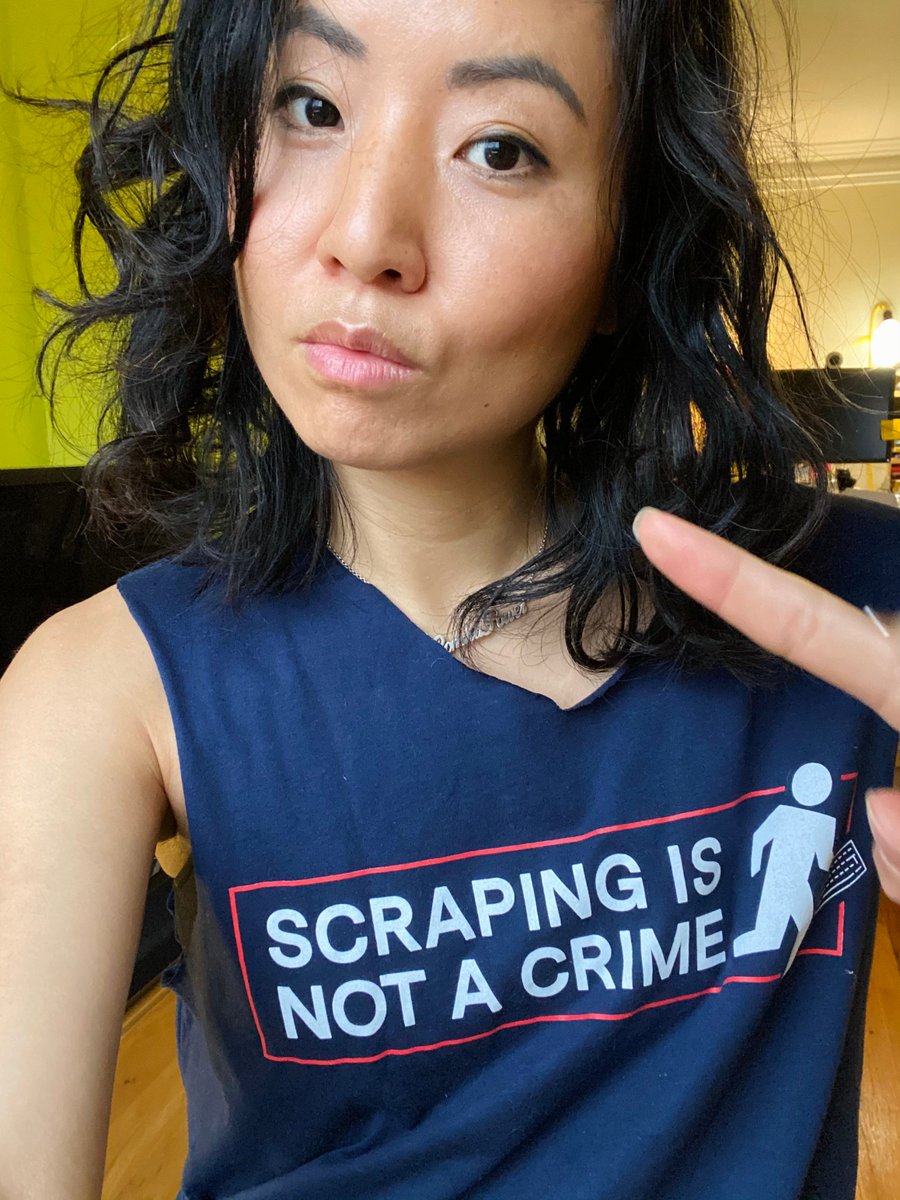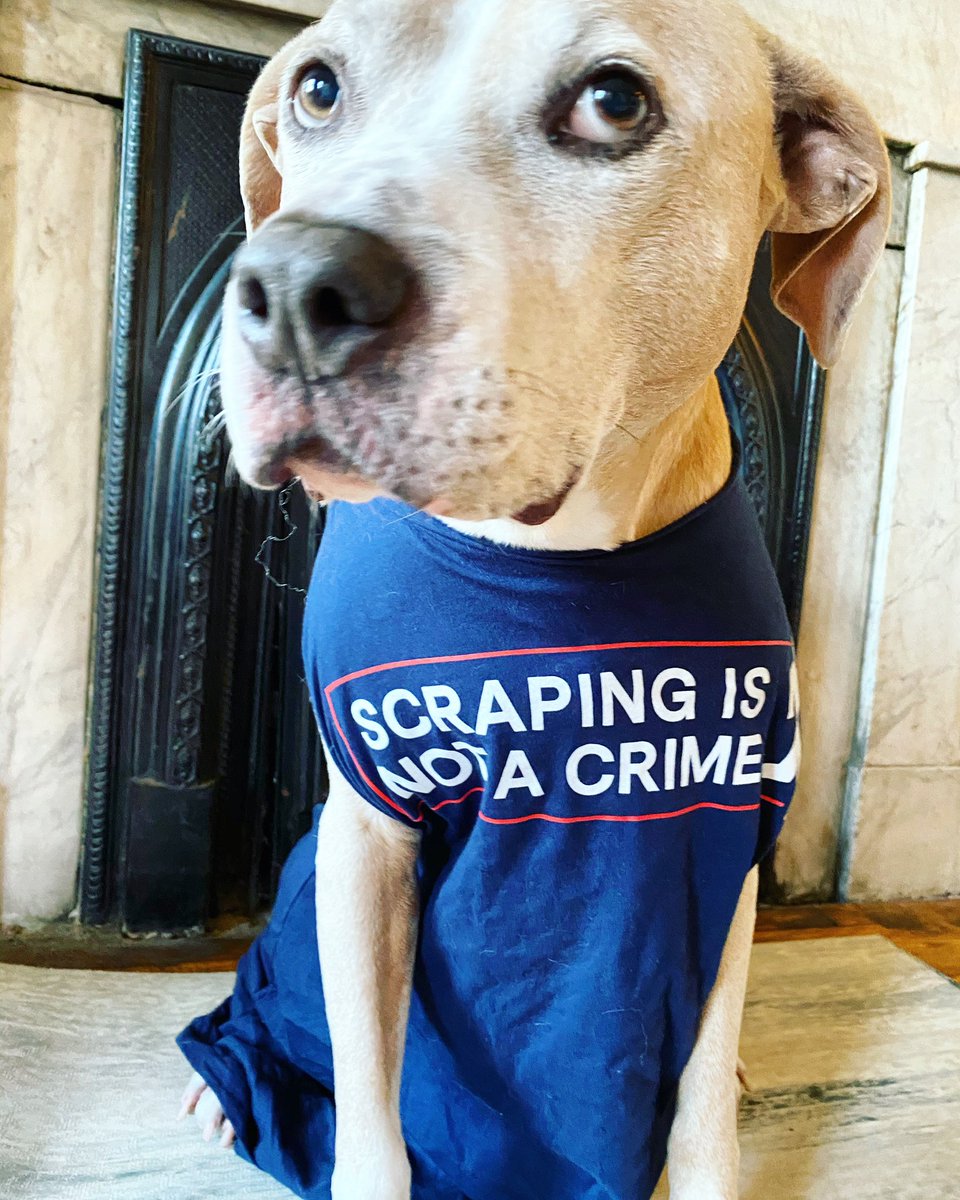A hearing happened yesterday that could radically change how we use the internet. Depending on how the Supreme Court rules on Van Buren vs U.S., third-party scraping could become a criminal activity. #scrapingisnotacrime
Scraping of publicly available data makes a more equal & inclusive internet. By blocking third-party scrapers, we would lose monitoring by data journalists, watchdog orgs, and researchers.
Here’s some of the stuff that would disappear due to being labeled criminal activity:
Here’s some of the stuff that would disappear due to being labeled criminal activity:
 Researcher projects & civil society institutions that monitor big tech uses data like @LauraEdelson2’s NYU Ad Observatory that observes political ad targeting https://thehill.com/policy/technology/522551-facebook-fights-nyu-political-ad-research-project-argues-it-violates-the
Researcher projects & civil society institutions that monitor big tech uses data like @LauraEdelson2’s NYU Ad Observatory that observes political ad targeting https://thehill.com/policy/technology/522551-facebook-fights-nyu-political-ad-research-project-argues-it-violates-the—GONE
 Or studies that how disinfo spread on social media networks - like the recently released incredible study on Facebook echo chambers from @hamahmrd’s @Amir_Ghasemianwork @aaronclauset @markusmobius & @DavMicRot @duncanjwatts https://twitter.com/homahmrd/status/1332369568162074626?s=20
Or studies that how disinfo spread on social media networks - like the recently released incredible study on Facebook echo chambers from @hamahmrd’s @Amir_Ghasemianwork @aaronclauset @markusmobius & @DavMicRot @duncanjwatts https://twitter.com/homahmrd/status/1332369568162074626?s=20 —GONE
 Being able to find lost websites or older versions - such as @internetarchive's quiet work of documenting culture + knowledge https://archive.org
Being able to find lost websites or older versions - such as @internetarchive's quiet work of documenting culture + knowledge https://archive.org —GONE
 Consumer protection - such as @camelcamelcamel price trackers for consumers https://camelcamelcamel.com/
Consumer protection - such as @camelcamelcamel price trackers for consumers https://camelcamelcamel.com/ Or @JuliaAngwin’s @suryamattu’s work on Amazon’s biased pricing algorithm
https://www.propublica.org/article/amazon-says-it-puts-customers-first-but-its-pricing-algorithm-doesnt
—GONE
 Algorithmic monitoring of racist, sexist software. All the work that @yeshican’s @Data4BlackLives is encouraging data activists to do would be illegal https://d4bl.org/action.html
Algorithmic monitoring of racist, sexist software. All the work that @yeshican’s @Data4BlackLives is encouraging data activists to do would be illegal https://d4bl.org/action.html --GONE
 Election campaigning data and election analysis - such as @alloydotus or @alex_gaynor's 2020 election scraper made with a team of contributors on Github https://github.com/alex/nyt-2020-election-scraper
Election campaigning data and election analysis - such as @alloydotus or @alex_gaynor's 2020 election scraper made with a team of contributors on Github https://github.com/alex/nyt-2020-election-scraper—GONE
 Even something as basic as collecting lots of headlines such as @importio's article assessing media coverage would be considered illegal https://www.import.io/post/trump-vs-biden-web-scraping-the-news-to-understand-media-coverage-and-sentiment/
Even something as basic as collecting lots of headlines such as @importio's article assessing media coverage would be considered illegal https://www.import.io/post/trump-vs-biden-web-scraping-the-news-to-understand-media-coverage-and-sentiment/—GONE
 COVID dashboards such as @alexismadrigal and @TheAtlantic's testing tracker https://covidtracking.com/
COVID dashboards such as @alexismadrigal and @TheAtlantic's testing tracker https://covidtracking.com/ Or @AviSchiffmann's @TheDanielConlon's very useful covid tracker - https://ncov2019.live/
—GONE
 White hat hackers who help tech platforms find vulnerabilities in their stack - @rootkovska’s work on Intel, @0xcharlie’s work on Apple, @dakami’s work on DNS — the work would be considered criminal
White hat hackers who help tech platforms find vulnerabilities in their stack - @rootkovska’s work on Intel, @0xcharlie’s work on Apple, @dakami’s work on DNS — the work would be considered criminal —GONE
Scraping in the connective tissue of the internet!
Without scraping:
1.) interoperability between platforms & scripts that make the cloud seamless could disappear.
2.) Important services that keep our internet healthy would disappear.
Without scraping:
1.) interoperability between platforms & scripts that make the cloud seamless could disappear.
2.) Important services that keep our internet healthy would disappear.
"Extracting or scraping that data for analysis flips the power balance so that the audience decides what can be done with the data." says the @markup in a great thread from them that explains the problems of CFAA https://twitter.com/themarkup/status/1333483635262038016
If the SC gives a shitty misinterpretation (legalese calls it “broad interpretation”) of the CFAA, scraping could become a criminal activity because of an outdated law from 1986 when we didn’t even have the WWW or a commercialized internet!
And the crazy part is that as backwards as the CFAA is big tech LOVES the CFAA ( @superwuster has dubbed it the Worst Law in tech for many good reasons documented here https://www.newyorker.com/news/news-desk/fixing-the-worst-law-in-technology )
The CFAA gives Big Tech cover to not share any data and claim that they're protecting users despite the fact they gather data from users and keep it in their walled gardens. Big tech is manipulating what is considered personal data and privacy
PERSONAL DATA- The data we put up on sites with the purpose of public SHARING is our personal data. Eg when you post your data to Linkedin, you want others to see it. But who owns that data? Can Linkedin prevent others from scraping the data that you’ve already made public?
Linkedin says yes, they own your data. They tried to do that in Linkedin vs HiQ-
https://www.ere.net/data-privacy-the-real-issue-in-the-linkedin-v-hiq-ruling/
But Linkedin lost! Good summary from @binarybits on @arstechnica. https://arstechnica.com/tech-policy/2019/09/web-scraping-doesnt-violate-anti-hacking-law-appeals-court-rules/ and @EFF https://www.eff.org/deeplinks/2019/09/victory-ruling-hiq-v-linkedin-protects-scraping-public-data#
https://www.ere.net/data-privacy-the-real-issue-in-the-linkedin-v-hiq-ruling/
But Linkedin lost! Good summary from @binarybits on @arstechnica. https://arstechnica.com/tech-policy/2019/09/web-scraping-doesnt-violate-anti-hacking-law-appeals-court-rules/ and @EFF https://www.eff.org/deeplinks/2019/09/victory-ruling-hiq-v-linkedin-protects-scraping-public-data#
Companies like Linkedin and Facebook are arguing that they are protecting users' privacy when they prevent scraping or data sharing. They are collapsing the context of data use and clumping all types of data together.
e.g. they don’t differentiate between 1:1 DM messages from the university you list. We need to distinguish data use by type in order to understand that scraping should be allowed for publicly shareable data.
PRIVACY - Big tech is weaponizing privacy to deflect attention from how they are managing our data in practice. Facebook's blatant attempt at this: @eff’s @mitchstoltz’s https://www.eff.org/deeplinks/2020/11/once-again-facebook-using-privacy-sword-kill-independent-innovation
Right now, privacy advocates like @EPICprivacy are buying it. They filed several amicus briefs in defense of the CFAA in the name of privacy - seriously WTF
https://epic.org/amicus/cfaa/linkedin/
https://epic.org/amicus/cfaa/van-buren/
https://epic.org/amicus/cfaa/linkedin/
https://epic.org/amicus/cfaa/van-buren/
Part of the issue is that talking about scraping solely through privacy is incredibly limiting and narrows our understanding of what is at stake. We need to expand our language to personhood, which is about self-determination and agency over our own livelihoods and lives.
With personhood, we could ask, does criminalizing scraping compromise people’s personhood? And you see all the ways it would prevent monitoring of abuses & therefore impede one’s personhood or a group’s communityhood.
More about personhood in this essay: https://deepdives.in/you-are-not-your-data-but-your-data-is-still-you-b41d2478ece2
More about personhood in this essay: https://deepdives.in/you-are-not-your-data-but-your-data-is-still-you-b41d2478ece2
Correction to tweets above - I meant to tag @themarkup ! Thanks you for all that you’re doing !
 federal gov would lose ability to respond to federal disasters if third party scraping were a crime says @denicewross -
federal gov would lose ability to respond to federal disasters if third party scraping were a crime says @denicewross - @disastahguy that would affect @disastertechinc services! https://twitter.com/denicewross/status/1333918299739009025
Gahhh @binarybits’s latest article on CFAA has me feeling so nervous like election week again ... https://arstechnica.com/tech-policy/2020/11/the-supreme-court-will-finally-rule-on-controversial-us-hacking-law/
Thanks @vvas for the tip
Thanks @vvas for the tip
EVEN my dog is alarmed about the impending Supreme Court ruling on CFAA this week.
She is proudly wearing @themarkup shirt #scrapingisnotacrime & talking all dogs to the cause
https://www.instagram.com/p/CIUJ2H3pNRP/?igshid=h03kmfioi3w1
She is proudly wearing @themarkup shirt #scrapingisnotacrime & talking all dogs to the cause
https://www.instagram.com/p/CIUJ2H3pNRP/?igshid=h03kmfioi3w1

 Read on Twitter
Read on Twitter



